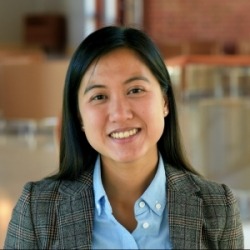
Games Without Frontiers
Anne Meng has joined the University of Virginia Department of Politics. She comes to our department from the University of California, Berkeley where she received her Ph.D. in Political Science and an M.A. in Economics.
Her research in Comparative Politics focuses on how political institutions emerge and develop in dictatorships – in particular how autocratic leaders choose to build or exploit their own ruling parties in order to stay in power. Meng uses game theory and statistical methods in her work and has a regional focus on Sub-Saharan Africa. She works with archival data and records, looking at state constitutions and succession rules to measure the institutionalization of parties and regimes. She also tracks ministerial appointments which reveal changing power structures over time.
“Anne’s work brings theoretical and mathematical rigor to the study of policies as she deploys formal, mathematical models of strategic interaction to help understand the complex ways in which countries develop stable political institutions.”
—David Leblang
Meng started graduate school as a China specialist, examining the development and rule of the Chinese Communist Party. Her fieldwork in China revealed how party officials tightly hold onto power, and she became especially interested in the question of how some autocratic parties become especially institutionalized and durable. To gain traction on this question, Meng expanded her regional focus to Sub-Saharan Africa, which provided a great set of cases with rapid development of parties—frequently emerging from rebel groups.
Party building in autocratic regimes is a difficult process to track. Meng has compiled an extensive dataset of post-independence parties and regimes in Sub-Saharan Africa from 1960-2005. She will be looking at more current regimes in the future and plans to expand her dataset to other regions. Going forward she is planning on publishing several articles based on this data and is writing a book on authoritarian institutions and dictatorships.
“Anne has a knack for finding creative solutions to thorny research challenges. This is exhibited in an original multi-method strategy for achieving causal inference that we developed in our research.”
—Brian Palmer-Rubin
She has published two papers co-authored with Brian Palmer-Rubin (Democracy Postdoctoral Fellow at the Ash Center for Democratic Governance and Innovation at the Harvard Kennedy School): Gerrymandering Opposition: Minority-Concentrated Districts and Electoral Competition in Mexico, forthcoming in Studies In Comparative International Development, and A Case for Case Studies: A Multi-Method Strategy for Ecological Inference in Qualitative and Multi-Method Research.
Meng comes to the Woodrow Wilson Department of Politics with a particular interest in our strong Comparative Politics faculty and in the prospect of working with Carol Mershon (Institutions and Coalitions), Dan Gingerich (Elections), David Waldner (Authoritarian Regimes), Denise Walsh (Institutions and Democratization), and Jonah Schulhofer-Wohl (Conflict), whose works dovetail nicely with her own.